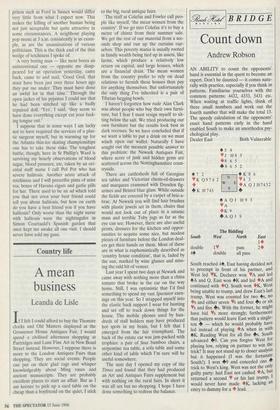Country life
A mean business
Leanda de Lisle
If I felt I could afford to buy the Thomire clocks and Old Masters displayed at the Grosvenor House Antiques Fair, I would spend a civilised afternoon shopping at Partridges and Lane Fine Art in New Bond Street instead. However, I suppose there is more to the London Antiques Fairs than shopping. They are social events. People can put on their glad rags and whisper knowledgeably about Ming vases and ancient manuscripts. They are probably excellent places to start an affair. But as I am keener to pick up a card table on the cheap than a boyfriend on the quiet, I stick to the big, rural antique fairs.
The staff at Colefax and Fowler call peo- ple like myself, 'the mean women from the country'. If we go into Colefax it's to buy a metre of chintz from their summer sale. We get the rest of our material from a sec- onds shop and run up the curtains our- selves. This poverty mania is usually rooted in family wealth being tied up in assets, like farms, which produce a relatively low return on capital, and large houses, which are a financial drain. The mean women from the country prefer to rely on dead relations to furnish these houses than pay for anything themselves. But unfortunately the only thing I've inherited is a pair of Tibetan begging bowls.
I haven't forgotten how rude Alan Clark was about people who buy their own furni- ture, but I fear I must resign myself to sit- ting below the salt. We tried producing our own furniture but the results look best in dark recesses. So we have concluded that if we want a table to put a drink on we must winch open our wallet. Naturally I have sought out the meanest possible answer to this problem: the Newark Antiques Fair, where acres of junk and hidden gems are scattered across the Nottinghamshire coun- tryside.
There are cattlesheds full of Georgian tea tables and Victorian chests-of-drawers and marquees crammed with Dresden fig- urines and Bristol blue glass. While outside the fields are covered by a carpet of bric-a- brac. At Newark you will find hair brushes with plastic jewels set in them, chairs that would not look out of place in a satanic mass and terrible Toby jugs as far as the eye can see. However, there are also useful prints, dressers for the kitchen and oppor- tunities to acquire some nice, but modest pieces of furniture before the London deal- ers get their hands on them. Most of these are in what is euphemistically described as `country house condition', that is, faded by the sun, marked by wine glasses and miss- ing the odd bit of veneer.
Last year I spent two days at Newark and came away with nothing more than a china tomato that broke in the car on the way home. Still, I was optimistic that I'd find something to spend my vast Spectator earn- ings on this year. So I strapped myself into the elastic back support I wear for hunting and set off to track down things for the house. The mobile phones used by hun- dreds of stall holders may have produced hot spots in my brain, but I felt that I emerged from the fair triumphant. The back of the estate car was jam-packed with trophies: a pair of faux bamboo chairs, a serpentine tea table, a sofa table and some other kind of table which I'm sure will be useful somewhere.
The next day I opened my copy of the Times and found that they had produced an Art and Antiques Fairs supplement but with nothing on the rural fairs. In short it was all sex but no shopping. I hope I have done something to redress the balance.


































































 Previous page
Previous page